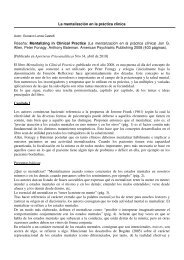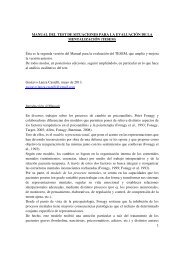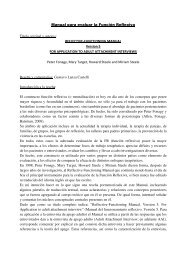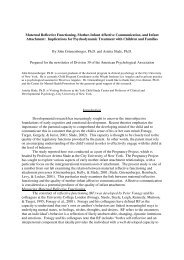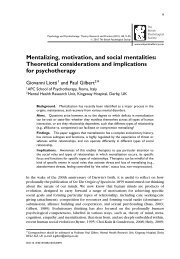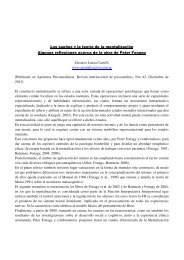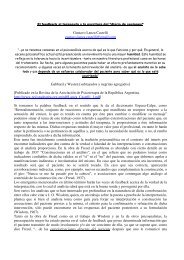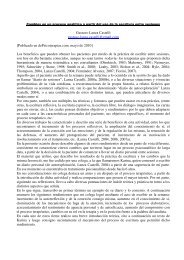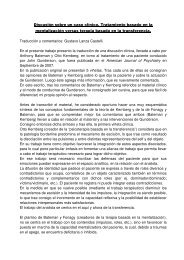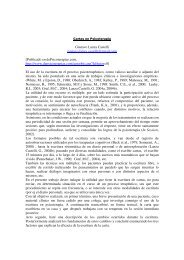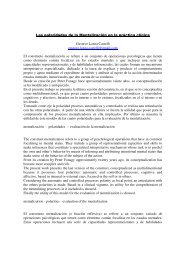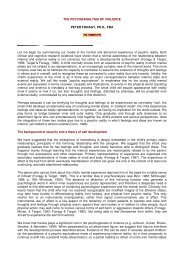Mentalization, Mental States and Affect Elaboration - mentalizacion y ...
Mentalization, Mental States and Affect Elaboration - mentalizacion y ...
Mentalization, Mental States and Affect Elaboration - mentalizacion y ...
Create successful ePaper yourself
Turn your PDF publications into a flip-book with our unique Google optimized e-Paper software.
Implications for psychoanalysis<br />
Study 1 has shown that it is possible for observers to differentiate between a positive, a<br />
negative <strong>and</strong> a neutral state of the transference-countertransference cycle of mutual<br />
projection <strong>and</strong> re-introjection. Discriminations between these states are based on an<br />
appreciation of two key characteristics: a) each participant's immediate mental state as<br />
either reactive (defensive or drive-related) or reflective; b) whether or not the patient's<br />
projections are being confirmed by the analyst's response. They also involve c) a<br />
consideration of linguistic styles (as defined by Liberman) in terms of their<br />
complementary or concordant sequence.<br />
The major implication is that these features, which include some manifestations of<br />
unconscious mental activity, can be monitored <strong>and</strong> are open to self-observation <strong>and</strong><br />
supervision.<br />
Study 2 confirms a partial convergence between the various operational measures of<br />
mentalisation, whether it is defined as reflective mental state, clarity of representation of<br />
mental states <strong>and</strong> intentions (reflective function) or as more contained <strong>and</strong> abstract forms<br />
in the verbal expression of affects.<br />
One implication points to the multidimensional nature of the mentalisation process,<br />
associated with at least each of the following facets: the subject's present mental state, the<br />
degree of affect transformation as expressed in words, the degree of development <strong>and</strong><br />
constancy of the intentional stance. Defensive activity, particularly at a high level (socalled<br />
neurotic defences) is associated with the absence of a personality disorder, which<br />
lends support to approaches (e.g. Kernberg's description of personality organization) that<br />
underscore the structural components of character formation, development <strong>and</strong><br />
pathology.<br />
The findings of both studies point to some possible convergence between mentalisation<br />
as a result <strong>and</strong> mentalisation as a process, exemplified by the contribution of a reflective<br />
mental state to a positive transference-countertransference configuration.<br />
Finally, the empirical study of the psychoanalytic process is a necessary validating <strong>and</strong><br />
complementary strategy to the clinical method.<br />
Keywords<br />
AAI interviews, affect elaboration, affect tolerance, countertransference, Liberman,<br />
<strong>Mental</strong> <strong>States</strong> Rating System, mentalization, personality disorders, positive <strong>and</strong> negative<br />
relationship configurations, reactive mental states, reflective function, reflective mental<br />
states, transference, Verbal <strong>Elaboration</strong> of <strong>Affect</strong>



